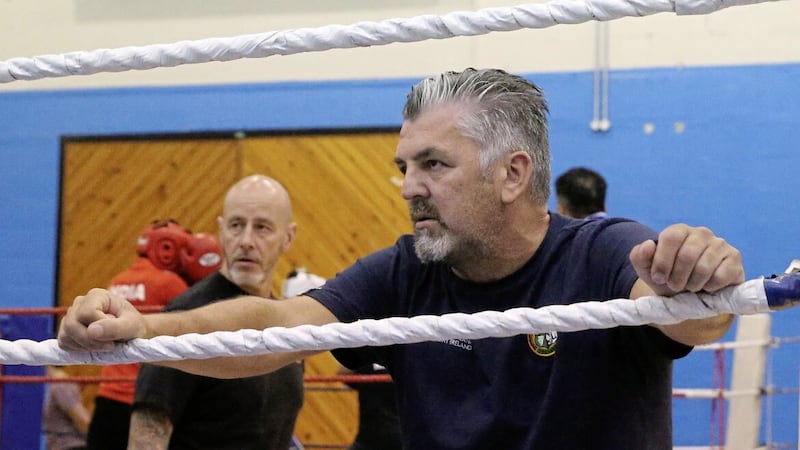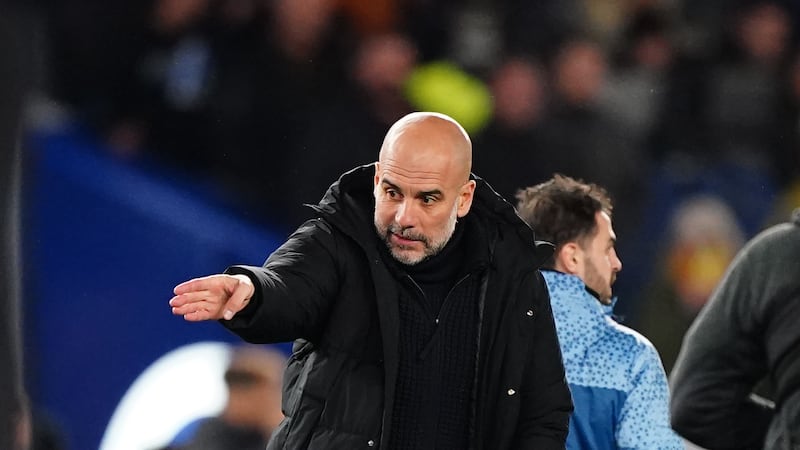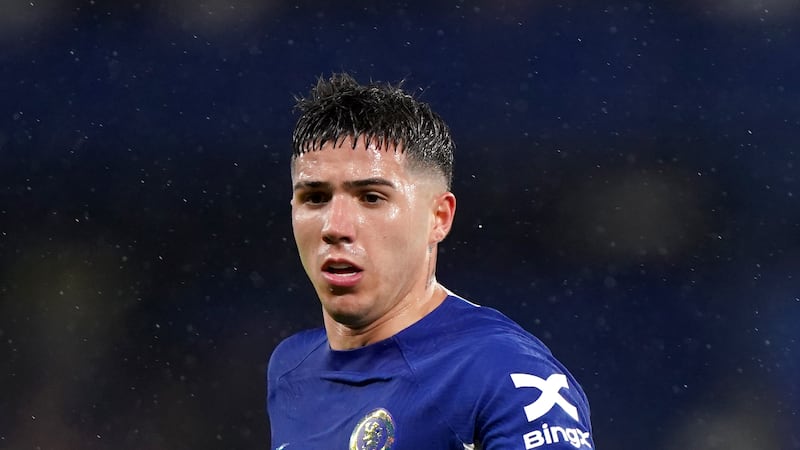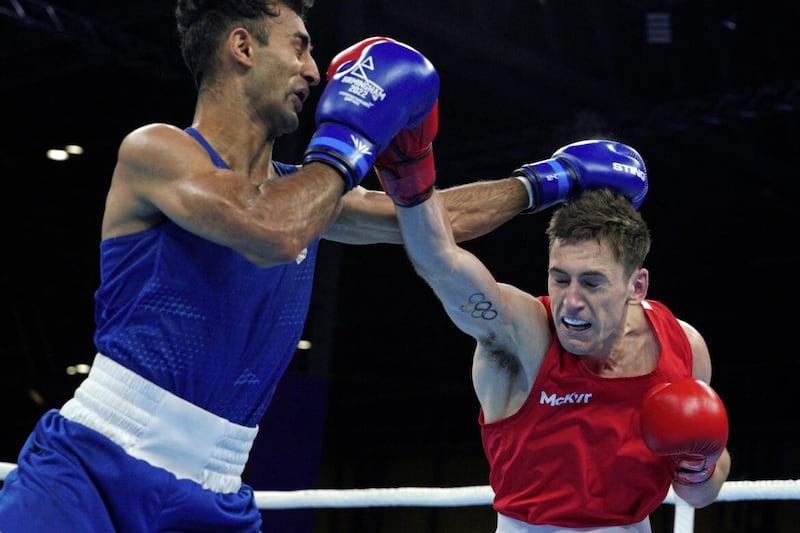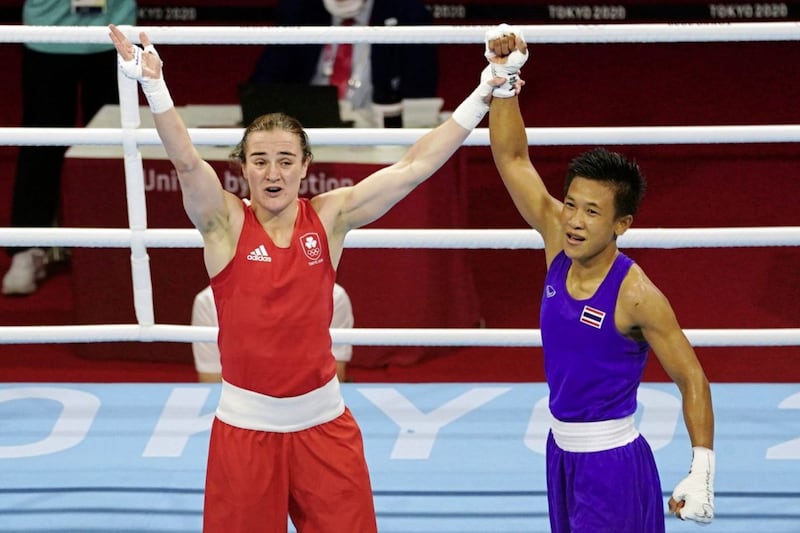AT the last two Commonwealth Games, the buck has stopped with John Conlan. If people had questions, they came to him. When answers were required, he was the man to provide them too.
The calm voice in the corner, guiding first a 2014 crop that included son Michael before six silvers were secured four years ago, he was the steadying hand steering Team NI’s fortunes in Glasgow and the Gold Coast.
And he’s still there of course, a willing confidante, ready to offer advice if needed, experience on tap to the rest of the crew. But Conlan’s role is different this time around.
When the action begins tomorrow, it isn’t him boxers will look to for instruction or support. Damian Kennedy is head coach in Birmingham, working alongside assistant coaches JP Delaney and Liam Corr, with Conlan in the background under the title ‘Performance Lead’ – a kind of grand overseer.
This is part of a coaching pathway put in place by the Ulster High Performance unit in recent years, with Kennedy’s ascension coming on the back of time served alongside Conlan, as well as at major international tournaments with Irish teams.
Natural progress, necessary, but relinquishing the kind of hands-on control that has become his norm, unable to wield the same influence in the heat of battle… how does that sit?
“I never even thought about that, to be honest.
“I actually trialled it when we were at the Eindhoven Cup, I let the other coaches do the corners. I did a lot of slabbering and shouting from the ringside and ended up hoarse, but no, I have complete faith in Damian and the team, they’re good coaches.
“We meet as a team on a regular basis, we’ll do a tactical plan for each athlete. I just think it’s important because we started a coaching pathway as well as an athlete pathway. That’s where Damian came through, JP… it’s a great system, we bring the coaches in, collective training with them, upskill them, give them all the information in terms of strength and conditioning, physiology, expose them to everything.
“Then we try and get them as much competitive experience as possible because they need it, same as the athletes. You’re under pressure in that environment, so you have to know your athlete, ask them the right things, have the trigger words each athlete understands…
“If that all stops behind me because I’m milking my ego or whatever, then it doesn’t work.”
Conlan and Kennedy have operated at close quarters for long enough that both know how to make sure the new arrangement runs smoothly.
“Damian did two Commonwealth Youth Games, worked as an assistant along with Pete Brady for the Gold Coast, he’s now working with Irish teams, so he has shown he really has that understanding and he’s handling the pressure of the big-time fights.
“When I thought about it, it was a no-brainer. Step aside, do all the bits and pieces that take the pressure off so he can deal with the coaching part, because normally I’m juggling all that. It’s much more relaxing for me to be able to sit back, let the guys deliver the training, every now and again challenge them, look over their shoulder and keep them on their toes.
“It’s crucial we can develop our coaches, and then they go back into the system working with athletes right through the programme. That was the thinking… maybe it’ll be different at the Commonwealth Games when I’m screaming and shouting and nobody can hear me.
“But, you know what? Sometimes you’ve got to sit back and let the people do their job.”
Conlan had to start somewhere too. Coaching wasn’t even on the radar in the first place, until the growing interest of his sons forced their father’s hand. From there, everything happened organically – no grand plan, no ultimate destination in mind.
The 2014 Commonwealth Games was a step into the unknown in some respects, but one Conlan felt ready to take by the time the opportunity arose.
“It seems a long time ago now,” he smiles.
“Like, I didn’t really want to do the coaching – Seanie McCafferty, who was one of my mentors and close friends, he forced me to go and do my level one because he wanted me to help in the corners.
“From thinking the Antrims was the be all and end all, then the Ulsters, then having an Irish champion, then brought in as a pool coach with the ‘A’ team with Austin Carruth and Gerry Storey, going to sh*t places with Billy Walsh’s da, sleeping in basically the same bed in a room that looked like something out of a horror movie.
“I learned a lot travelling but there’s nothing like being thrown under the bus and saying ‘you’re the head coach, the buck stops with you’. I had a great team in 2014, I remember wanting to bring them in earlier, I wanted it to be the best Games ever… I actually sent Paddy and Michael home early for a couple of weeks because I needed to work on some fundamentals with the other guys.
“Then when the team came together, they created a great atmosphere, we went to Glasgow, cleaned up, in my opinion.”
Michael and Paddy Barnes both won gold, Joe Fitzpatrick and Michaela Walsh silver – “Michaela should have been Commonwealth champion” – while Connor Coyle, Steven Donnelly, Sean Duffy, Sean McGlinchey and Alanna Audley-Murphy all brought home bronze.
“Apart from anything else,” he continues, “it was a great experience.
“I learned a lot about strategic planning, preparation, loading, tactical planning, getting things right on a day to day basis. It was massive.
“When I was finished I was completely exhausted but it was a massive learning curve. I came back and set up the High Performance here, and I was like a kid in a sweet shop because I had that experience and I understood what full-time training was like with athletes.
“I did a couple of Worlds then, Europeans, I had the honour of going to the Olympic Games in Rio, which turned out a bit of a nightmare. The prep was the same as we’d done for any other Olympic Games, but it was a perfect storm when we got out there… I came out of that much stronger as a human being, and also as a coach.
“I learned a lot of lessons - not to be as naïve and trust people. We always talk about the resilience of athletes, but the coach has to be resilient as well.”
With an Olympic bronze medal in his back pocket by the time the Glasgow Commonwealths rolled around, Michael Conlan’s amateur career was moving into a different stratosphere year on year - culminating in World Championship gold in 2015, the first Irish male to do so.
On Saturday, August 6 the 30-year-old bids to bounce back from his first pro defeat at the hands of Leigh Wood back in March when he takes on tough Colombian Miguel Marriaga at the SSE Arena.
The Commonwealth semi-finals take place that day too, and Conlan will be guided by events in Birmingham before making a call on whether or not he will fly back to Belfast.
The bond between father and son needs little explaining, especially with both so immersed in the same world, and it was the early stages of their journey together that opened John Conlan’s eyes – and ultimately led him to the point where he stands today.
“That was actually massive, and this is part of the reason we’re trying to develop coaches.
“My experience was limited and I had a talented athlete who was in a national High Performance programme.
“Coming back every weekend and working with him, seeing different wee things he was doing, I was always on a learning curve because of what he was bringing back. When I got into the High Performance and saw what they were doing, I’ve got to be honest, I probably didn’t agree with half the stuff - I was going ‘this is sh*t’.
“But once I understood it and was exposed to a little bit more international-style boxing, I realised actually, Irish boxing is in a really strong place.
“One of the key things is to train full-time so we’re on a level playing field with other countries, especially in the Eastern Bloc where it’s massive to have that national pride in their ability to win medals at the highest level, and the programme rewards them.
“When you look at our programme, we don’t have that many athletes funded. When you see athletes thoroughly enjoying it, sacrificing job opportunities, university careers, apprenticeships, family life… it’s very frustrating when they’re not getting rewarded.
“It’s very difficult for me as a human being to see that, the hardships our guys go through on a daily basis, and I believe we should be looking at how we can support them a little bit better on that entry level into the programme, but also the exit level because we have athletes who have sacrificed an awful lot, are at the end of their career.”
